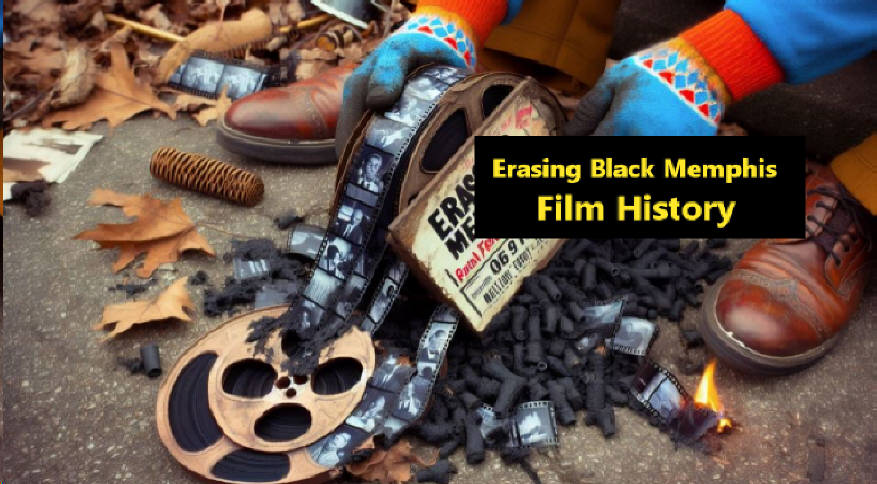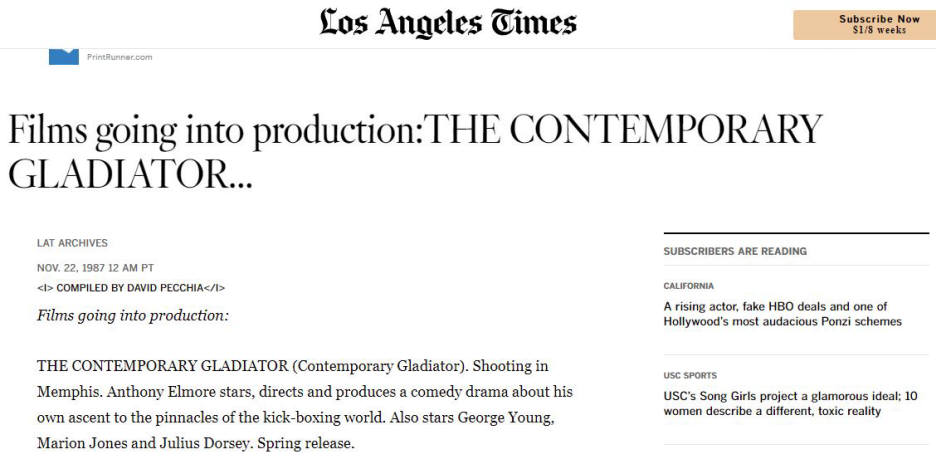
Erasing Black Memphis Film History
The Untold Story of “The Contemporary Gladiator”
In 1987, Anthony “Amp” Elmore embarked on a groundbreaking endeavor: producing Memphis’ first independent 35mm film, titled “The Contemporary Gladiator.” This achievement was historic, not only for Elmore but also for the entire Memphis film community. However, despite its significance, the film faced challenges that reveal deeper issues within the industry.
Orange Mound: A Historic Black Community
Before we dive into the film itself, let’s acknowledge Orange Mound—a remarkable Black community in Memphis. Founded in 1879, Orange Mound holds the distinction of being the first community in America built for Blacks by Blacks. Its rich history and cultural heritage deserve recognition and celebration.
Elmore’s Pioneering Efforts
Anthony “Amp” Elmore, a Memphis-born five-time world karate/kickboxing champion, took on the role of a filmmaker with determination. His mission extended beyond entertainment; he aimed to tell the unknown and untold Black Memphis history through film. Elmore’s vision led to the creation of the “Orange Mound Black Memphis Hollywood” film culture.
In 1987, Anthony “Amp” Elmore embarked on a groundbreaking endeavor: producing Memphis’ first independent 35mm film, titled “The Contemporary Gladiator.” This achievement was historic, not only for Elmore but also for the entire Memphis film community. However, despite its significance, the film faced challenges that reveal deeper issues within the industry.
Orange Mound: A Historic Black Community
Before we dive into the film itself, let’s acknowledge Orange Mound—a remarkable Black community in Memphis. Founded in 1879, Orange Mound holds the distinction of being the first community in America built for Blacks by Blacks. Its rich history and cultural heritage deserve recognition and celebration.
Elmore’s Pioneering Efforts
Anthony “Amp” Elmore, a Memphis-born five-time world karate/kickboxing champion, took on the role of a filmmaker with determination. His mission extended beyond entertainment; he aimed to tell the unknown and untold Black Memphis history through film. Elmore’s vision led to the creation of the “Orange Mound Black Memphis Hollywood” film culture.
The Battle Against Racism
Despite Memphis being a city with a 70% Black population, the local film culture proved unfriendly to Black filmmakers. Elmore faced obstacles that stemmed from systemic racism. His film, “The Contemporary Gladiator,” became a battleground for heritage and honor.
The Unfair Treatment
Elmore’s film production journey was fraught with challenges. While Hollywood characters often dominate the screen, Elmore’s characters were real—representing the vibrant stories of Orange Mound and its people. Yet, Memphis media largely ignored his groundbreaking work.
The L.A. Times and the Erasure
Interestingly, while local Memphis media failed to cover Elmore’s 1987 production, the Los Angeles Times recognized its significance. The question arises: Why did a prestigious paper like the L.A. Times cover the story, while Memphis media remained silent? Elmore’s answer is clear: racism. The film’s impact and cultural importance were overshadowed by systemic biases.
Despite Memphis being a city with a 70% Black population, the local film culture proved unfriendly to Black filmmakers. Elmore faced obstacles that stemmed from systemic racism. His film, “The Contemporary Gladiator,” became a battleground for heritage and honor.
The Unfair Treatment
Elmore’s film production journey was fraught with challenges. While Hollywood characters often dominate the screen, Elmore’s characters were real—representing the vibrant stories of Orange Mound and its people. Yet, Memphis media largely ignored his groundbreaking work.
The L.A. Times and the Erasure
Interestingly, while local Memphis media failed to cover Elmore’s 1987 production, the Los Angeles Times recognized its significance. The question arises: Why did a prestigious paper like the L.A. Times cover the story, while Memphis media remained silent? Elmore’s answer is clear: racism. The film’s impact and cultural importance were overshadowed by systemic biases.
Seeking Justice
Elmore’s fight continues. He calls upon Shelby County elected officials to address the unfairness within the Memphis film culture. His battle isn’t just about a single film; it’s about preserving the heritage of Orange Mound and ensuring that Black filmmakers receive the recognition they deserve.
Let’s Share the Story
As we honor Elmore’s pioneering spirit, let’s amplify the narrative of “The Contemporary Gladiator.” Through our website, we can showcase this historic film, complete with pictures and context. By doing so, we contribute to the legacy of Orange Mound and challenge the status quo.
Elmore’s fight continues. He calls upon Shelby County elected officials to address the unfairness within the Memphis film culture. His battle isn’t just about a single film; it’s about preserving the heritage of Orange Mound and ensuring that Black filmmakers receive the recognition they deserve.
Let’s Share the Story
As we honor Elmore’s pioneering spirit, let’s amplify the narrative of “The Contemporary Gladiator.” Through our website, we can showcase this historic film, complete with pictures and context. By doing so, we contribute to the legacy of Orange Mound and challenge the status quo.

Just Google the Words "The Contemporary Gladiator" L A Time and this 1987 story come up in the L A Times achives. In Memphis Anthony "Amp" Elmore 's film history has been "purposefully obscured." Memphis Film Commissioner Linn Sitler with her White friends in the Memphis Media makes sure that any story regard Anthony "Amp" Elmore's Film history goes un acknowledged via the Memphis media. Both Blacks and Whites use their positions to erase Anthony "Amp" Elmore's Black Memphis Film History.